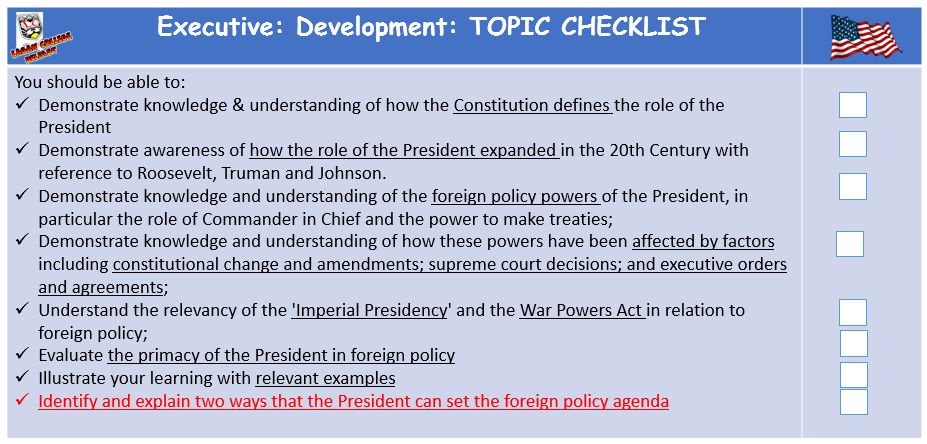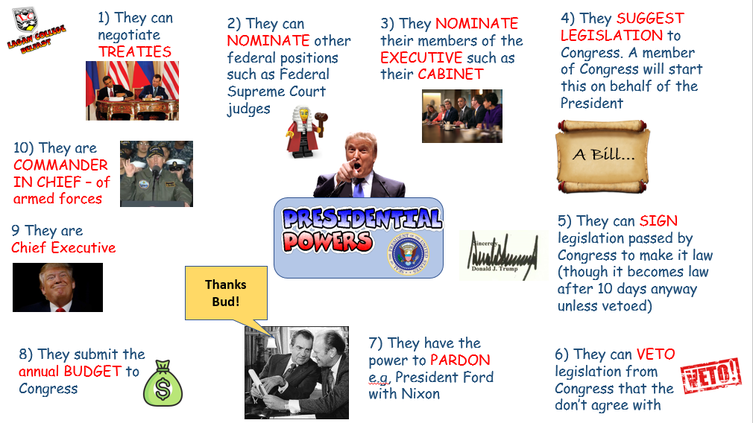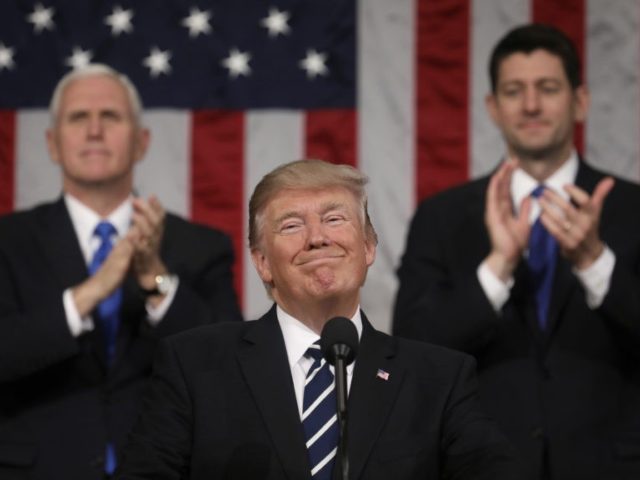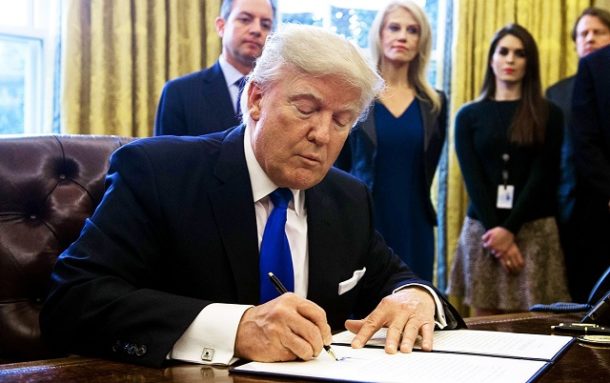When we think about American Politics, invariably one person springs to mind - The President.
They seem to symbolise American power and government. However it is important that we really understand what the Presidency is and indeed is not.
It is no doubt a very powerful organisation but it does have its limitations
Many have described it as a PARADOX: POWER & WEAKNESS
They seem to symbolise American power and government. However it is important that we really understand what the Presidency is and indeed is not.
It is no doubt a very powerful organisation but it does have its limitations
Many have described it as a PARADOX: POWER & WEAKNESS
WHAT IS THE ROLE OF THE PRESIDENT IN THE CONSTITUTION ?
If we look back to what the Founding Fathers wanted from a President - the answer is ambiguous and perhaps necessarily so, as this has helped the Presidency survive and evolve in the midst of great world changes and challenges.
THE TWO VIEWS in the 1780's
THE TWO VIEWS in the 1780's
- One group were opposed to a strong Presidency. They feared that a President would simply become a TYRANT or elected monarch. They were keen to LIMIT the Presidency
- The other group however recognised the need for a STRONG and charismatic leader to lead in times of crisis. To give political direction and to act as Head of State. They wanted a strong President
HOW DID THEY COMPROMISE?
The compromise created a special type of Presidency:
- Endowed with important powers but also...
- Limited in how they can use those powers.
- They are both HEAD OF STATE and HEAD OF GOVERNMENT ( Like the Prime Minister and Queen rolled into one) They personify and lead the nation in times of crisis
- They are CHIEF EXECUTIVE based around one individual. Of course now the Presidency has a vast collection of staff to help as well as the Cabinet but essentially the responsibility will lie with the President.
- They are indirectly elected as President through the Electoral college. This gives them a mandate.
- Lastly they created a Presidency limited by checks and balances. This creates many limitations for a President which are not easily overcome and often lead to frustration.
'The executive power shall be vested in the President of the United States' Article 2 of the US Constitution
1) PROPOSE LEGISLATION TO CONGRESS
LIMITATIONS
REMEMBER:
|
|
2) SIGN LEGISLATION
|
Just like the Queen giving assent to bills in the UK to make them law, the President also has to sign bills to legally enact them.
HOWEVER unlike the UK the President also has a range of powers open to them when a bill arrives for them to sign. (In the UK the Queen HAS to sign as she has no mandate to reject a bill. Refusal from her would result in a Constitutional crisis) WHAT POWERS ARE OPEN TO THE PRESIDENT?
|
|
3) VETOING A BILL
|
One of the Presidents key powers is the choice to say "no" to any bill by the use of a VETO
This is a power which has to be used sparingly and can be overridden by a vote in Congress. However, it remains an important Presidential weapon and even the threat of it can be an important bargaining tool. WHAT HAPPENS?
When George Bush (senior) was president, Congress tried to override his vetoes 36 times but was successful only once. President Obama used the power only 4 times in his 8 years in office - a record low. An example of his veto was the approval for an oil pipeline called the Keystone pipeline. Obama felt it could be an environmental and security problem. There have been 2,500 Presidential vetoes in 230 years. Only just over 100 have been overridden! (less than 4%) LIMITATIONS Just remember: The Presidential veto has its limitations too:
|
|
4) SUBMIT BUDGET
- The budget is drawn up every year by a dedicated department within the EXOP
- This is then submitted to Congress for approval (Remember House of Representatives controls the purse strings.)
- There is often intense political bargaining around the budget - especially when the President and Congress represent different parties.
LIMITATIONS
REMEMBER:
- Congress HAS to approve the Presidential budget.
- This can severely restrict a President from fulfilling his objectives
EXAMPLE:
- A very partisan Congress delayed supporting President Clintons budget in 1996. This led to gridlock and the closure or much of the federal bureaucracy as the two sides refused to back down.
- A Democrat controlled Congress tried to limit George W Bush's spending on Iraq
- A Republican controlled Congress led to Gridlock over Obamas budget including his attempts to get the country out of the Credit crunch crisis - created by the Republicans.
5) CHIEF EXECUTIVE
One key Presidential role that is undeniable as it is in black and white in the US Constitution is that the President is in charge of the Executive branch which remains an enormous task. This is in effect the role of running the huge Executive departments.
Much of the work is in fact delegated to principal departments and agencies of the federal government.
Much of the work is in fact delegated to principal departments and agencies of the federal government.
6) NOMINATE KEY MEMBERS OF THE EXECUTIVE
Just like in the UK, the President has the power to NOMINATE key individuals to the various branches of the Federal Executive. This includes nominating the key heads of the 15 Executive departments such as Secretary of State ; Treasury etc.
Unlike in the UK, where cabinet ministers have to be in Parliament, the President can actually choose his nominees from a variety of backgrounds he feels are best suited to the post.
LIMITATIONS
REMEMBER:
Unlike in the UK, where cabinet ministers have to be in Parliament, the President can actually choose his nominees from a variety of backgrounds he feels are best suited to the post.
LIMITATIONS
REMEMBER:
- Again unlike the UK, where the PM has a relatively free hand in appointing Ministers, it is important to note that the President only NOMINATES people for these posts. Each position has to then be CONFIRMED by the Senate.
7) NOMINATE FEDERAL JUDGES
This involves not just appointing Supreme court judges but also Federal trial and appeal courts.
In America, with its intensely legal political system, these are big decisions:
REMEMBER:
In America, with its intensely legal political system, these are big decisions:
- Judges are appointed for life
- Judges can also have a political tinge, especially in the Supreme Court. Their interpretation, as we have seen is highly important and can affect governments. The example of Courts overriding President Trump's draconian anti immigration stance is a case in point.
- The appointment of Supreme Court Judges is rare (due to the age factor and the fact they are appointed for life- some appointed by Nixon are still serving!) However, there are sometimes intense political battles when they are nominated. President Obama managed two nominations - Sonia Sotomayor and Elena Kagan - You can see the confirmation hearings in the Congressional oversight section and see the lobbying against each in the pressure group section.
REMEMBER:
- All appointments have to be agreed CONFIRMED by the Senate. They can and have been overturned (although this is relatively rare)
- President Obama had a recommendation unconfirmed for Merrick Garland for such a long time that it was never implemented leaving it to President Trump to make his own call.
8) COMMANDER IN CHIEF
One key role the President has is as commander in chief. This is a very important role which the President can use to their advantage if played right.
LIMITATIONS
REMEMBER:
EXAMPLE: In 2002 Congress approved the use of US troops in Iraq 296-182 (HOR) 77-23 (Sen)
- This role was especially powerful in the 20th Century with two world wars and a prolonged cold war - with many conflicts including Korea and in particular Vietnam.
- The end of the cold war seemed to spell the decline of this power but 9/11 has perhaps changed the emphasis.
- While wars may help Presidents they can also destroy them - President Johnston was deeply harmed by Vietnam ; George W Bush gained support for his response to 9/11 only to end up deeply unpopular over Iraq.
- President Obama has been more strategic and precise in his foreign interventions with surgical attacks such as that on Osama Bin Laden .
LIMITATIONS
REMEMBER:
- Congress controls the power of spending (and wars are very expensive!!)
- Congress also has the power to declare war AND conduct investigations. This was poorly carried out when Republican President Bush was supported by a Republican controlled Congress. However, the opposite was true when the Democrats took over control.
- Congress has to give its authorisation for the use of US troops abroad
EXAMPLE: In 2002 Congress approved the use of US troops in Iraq 296-182 (HOR) 77-23 (Sen)
9) NEGOTIATE TREATIES
Presidents are also responsible as Head of State and political spokesperson for the US, for making Peace as well as war. As a Superpower the US has a great deal of responsibility: Even in Syria today many are awaiting for the US to get involved.
Presidents negotiate treaties on behalf of the country. :
EXAMPLES: Treaty of Versailles (1919) - not ratified
Nuclear reduction treaties with the USSR (1970's /80's)
Chemical Weapons Ban (1990s)
LIMITATIONS
REMEMBER:
Presidents negotiate treaties on behalf of the country. :
EXAMPLES: Treaty of Versailles (1919) - not ratified
Nuclear reduction treaties with the USSR (1970's /80's)
Chemical Weapons Ban (1990s)
LIMITATIONS
REMEMBER:
- The Senate HAS to RATIFY any treaties - The most famous example was the failure to ratify the Treaty of Versailles leaving the world free to go to war again 20 years after WW1
- The Senate rejected treaties on 7 occasions in the 20th Century
|
|
|





